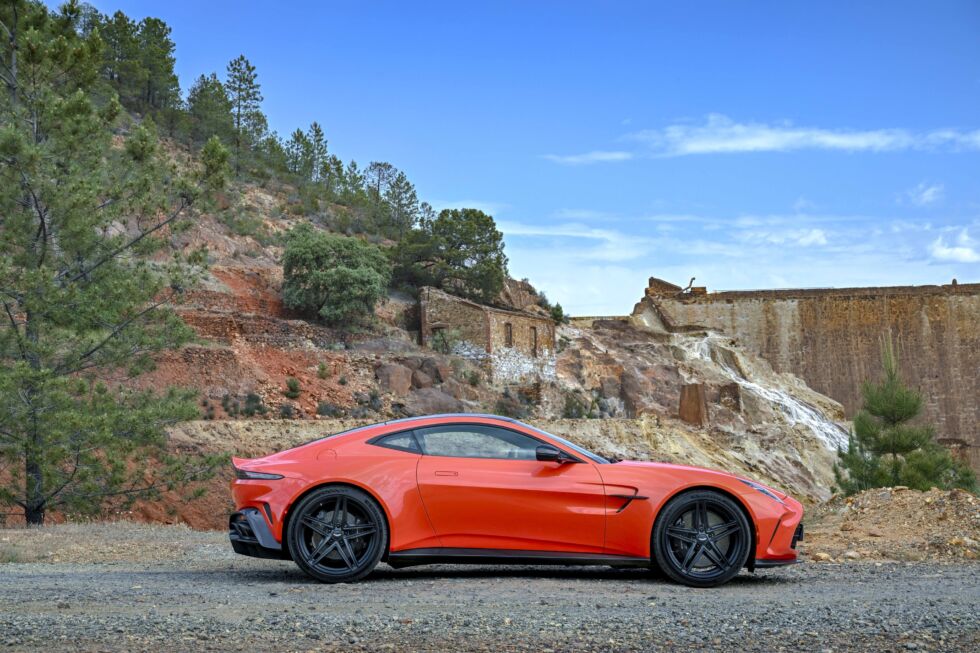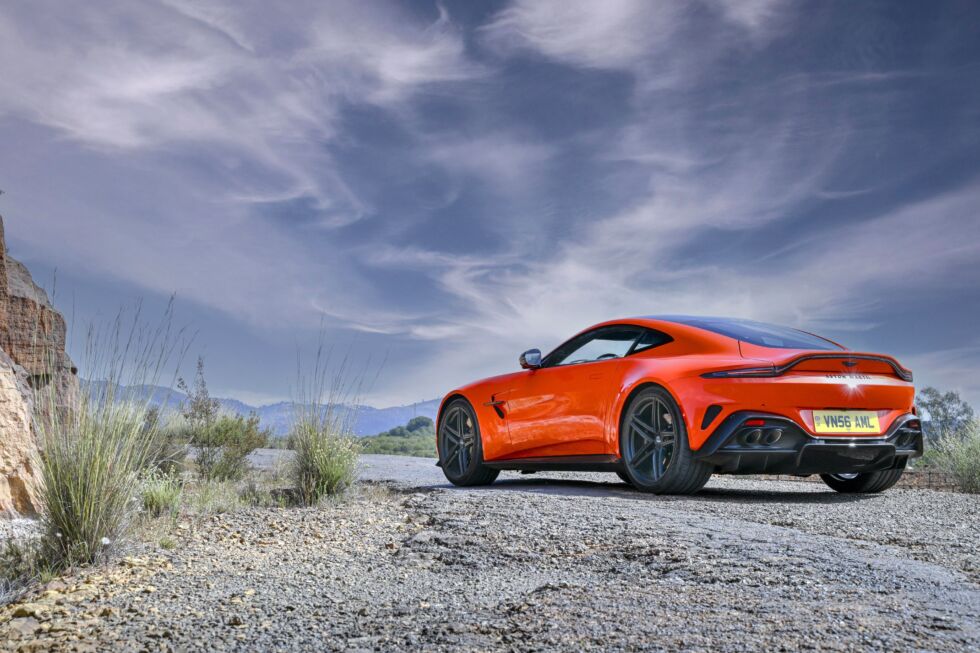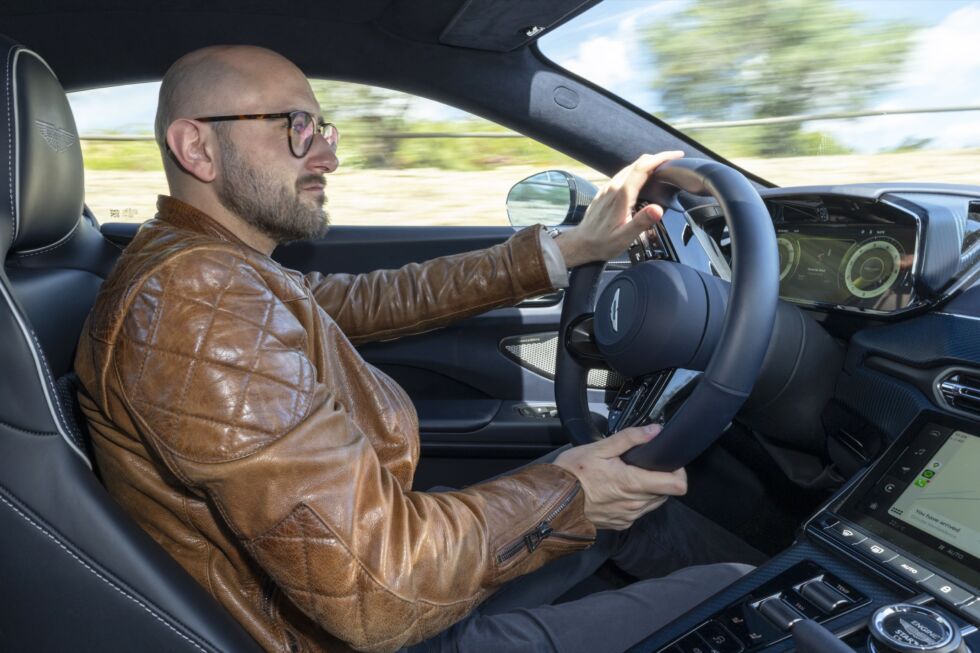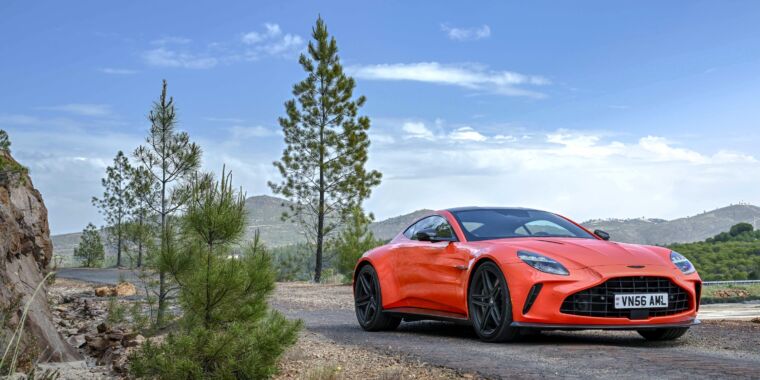Aston Martin
It’s high time Aston Martin had a winner on its hands. Last year it updated the DB12 with smart new face, plenty of power, and the sort of infotainment you’d hope for from a luxury GT. The Vantage, the firm’s ‘entry-level’ car, has been given similar treatment in the hopes that it can peel a few more people away from Porsche dealerships.
Aston’s looking not only to make better cars, but to shift its image—it’s aiming to be seen as more luxurious than before, as well as throwing as much power at the cars as possible. At first glance, it looks like Aston’s cooked up something truly delightful.
The new car is more than 150 hp (112 kW) more powerful than the one it replaces, with 656 hp (490 kW) and 590 lb-ft (800 Nm) from a wonderfully appointed turbocharged 4.0 L V8. 0-60 mph is quoted at 3.4 seconds, and Aston reckons that if you have enough space (and no speed limits) you’ll see the far side of 200 mph (321 km/h). It is not slow.
Aston’s never really had a problem with building good-looking cars, but the new Vantage is a huge leap over its immediate predecessor. With the old car, the idea was that each model in the line up would look suitably different depending on what it did. It was supposed to look like an athletic, purposeful, sportscar. And it did. But it didn’t nail its Aston Martiness.

Aston Martin
The new one very much does. From its new headlights, to its grille, side vents, skirts, quad exhaust pipes, and one of the best rear ends on the market today, the new car looks like an Aston Martin through and through. Of course, some of the changes are necessary—the front grille is 38 percent bigger than before because having a V8 with quite so much power means it needs better cooling. In fact, look closely and you’ll spot a number of tricks Aston’s used to improve cooling and airflow all over the car. Were I the type to wear my glasses at the tip of my nose I’d start muttering something about “form and function working in harmony,” but I’m not, so I won’t.
Aston’s made a point of saying there won’t be another V12 Vantage, and that the last generation’s take on it was the end of the line. This meant the engineers didn’t have to worry about giving the V8 so much power. The old V8 Vantage could have been nearly as potent, but the need to differentiate with the V12 meant it would have been imprudent.
The outside will turn heads, the inside should make you smile. The direct predecessor’s seats and dash were pleasant, and comfortable, but the center console and infotainment? Not great. It was of the ‘slap a tablet to the dash’ generation, and it was run off a reskinned version of Merc’s COMAND system which was definitely of its era and not a patch on current systems. Today’s Vantage gets the same setup you’ll find in the DB12—a 12.5-inch touch screen, paired with actual buttons that do actual things.

Aston Martin
The screen itself is responsive and quick, while the buttons feel ‘right’ for what they need to do. A big dial in the middle of the console switches between Sport (the Vantage’s standard mode), Sport+, Individual, Track, and Wet modes. Pleasingly, Aston’s kept the things you need easy access to within easy, physical reach.
With great power, comes an awful lot of noise, particularly on start-up. Anyone saying that turbocharging has killed exhaust notes should spend a bit of time with this car. There are three exhaust settings: normal, loud, or very loud. Very loud is where your happy place will probably lie. Your neighbors, not so much.
On the road, despite its excessive power, it’s easy to drive. You can see well enough out of the front, although the A-Pillars are a little chunky. The mirrors are large enough to give you a wide view of what’s behind you, and none of the controls are in any way complicated. It’s been designed so that people who like driving can get on with just that.

Aston Martin
Point it at a straight, floor the throttle, and you’ll find yourself making interesting noises (most of them of the four-letter variety). Power delivery is smooth but can be quite violent if you choose it to be. It’s far more ‘scruff of the neck’ than a 911 Turbo S, and feels all the better for it. The steering, no matter which mode you plump for, is a touch on the light side but it gives wonderful feedback. It springs neatly as you switch from left to right, deftly pinging the car’s nose from apex to apex.
The standard Sport setting is about right for regular asphalt—the suspension doesn’t feel too hard, and its powertrain is suitably savage. Flipping it into the harsher Sport+ or Track modes makes proceedings a touch uncomfortable, and perhaps unnecessary for the highway. Its eight speed ZF automatic transmission is a joy, too.
On track you can explore it a little more. You realise, quickly, how capable and communicative it is. The car will move around, reacting to how you’re treating it, letting you know what’s about to happen. It means you can easily start to anticipate the car and find yourself having an awful lot of fun. It’s important to remember that there really is more than sufficient power under the hood though, so perhaps not turning the nine-stage adjustable traction control all the way off too early is a wise move.
-
The interior has been given a little upgrade too.
Aston Martin -
Do you like buttons? Because the Vantage has plenty of buttons.
Aston Martin -
Push to start.
Aston Martin -
Aston Martin -
That’s a huge brake disc.
Aston Martin
In the past, the Vantage has always played second-fiddle to the far more numerous Porsche 911 as the default choice for a daily driver sports car for someone looking to spend six figures. But with the new car’s massive power bump and an expected price closer to $200,000, we expect the 2025 model to be a little a more exclusive.









